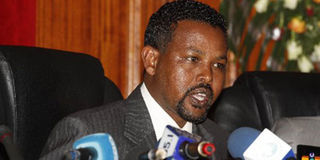Unfinished business on road to a new Kenya

Parliamentary Select Committee on Constitution chair Abdikadir Mohamed. Photo/FILE
Parliament and Cabinet have had to burn the midnight oil to beat a deadline set out in the Constitution implementation schedule.
Parliament risked dissolution if it failed to meet the schedule.
The Cabinet also met on a Saturday to deal with four pending Bills to ensure crucial laws were passed ahead of today’s deadline.
Attempt by the chairman of the Constitution Implementation Commission, Mr Charles Nyachae, to stop two Bills that needed to be cleared by today failed after Parliament went ahead and passed them.
Compromise their quality
Mr Nyachae had said the Contingencies Fund (Article 208) and Loan guarantees by National Government (Article 213) should have been stopped because the Cabinet changed some clauses unconstitutionally.
“We did not agree with the way the Cabinet went through the whole process and we moved to court on (Thursday) to contest the debating of the two Bills in the House until the due process is followed,” said Mr Nyachae.
Former Committee of Experts official Otiende Amollo said passing Bills in a hurry to beat deadlines could compromise their quality.
“I do not want to completely say that the quality is compromised when they are done in a rush, but it is important to know that citizens must also have an opportunity to contribute,” said Mr Amollo.
However, the chairman of Constitution Implementation Oversight Committee, Mr Abdikadir Mohamed said he was confident the quality of laws was not compromised by the rush.
“The laws have gone through all the required processes of law-making and there is no way we can say they were compromised as committees in the House went through the bills in detail,” said Mr Mohamed.
Parliament will in the second year of the new Constitution be expected to pass 14 Bills as part of the implementation process.
According to Mr Nyachae, five Bills will need to be enacted within 18 months.
They include the legislation on Land (Article 68), Removal of a county governor (Article 181) and Vacation of office of member of county assembly (Article 194).
Funds to be allocated
“Others are legislation to effect Chapter 11 (Article 200 and Sixth Schedule, Section 15) and Revenue Funds for county governments (Article 207) which will spell out the funds to be allocated,” said Mr Nyachae.
Also in the next year, Parliament will be required to legislate on the other Bills that include Legislation on leadership (Article 80), Right of recall (Article 104), and Determination of questions of membership of Parliament (Article 105) and Right to petition Parliament (Article 119).
Others are Assumption of Office of President (Article 141), Judiciary Fund (Article 173, Financial control (Article 225), National security organs (Article 239) and Command of the National Police Service (Article 245).



